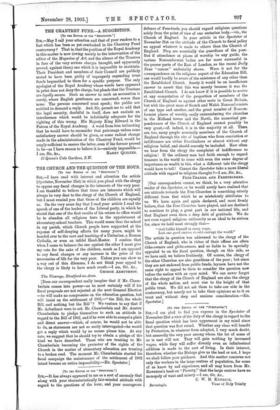THE CHURCH AND THE QUESTION OF THE HOUR.
[To THE EDITOR OF THE "SPECTATOR."]
have read with interest and attention the article (Spectator, November 21st) in which you plead with the clergy to oppose any fiscal changes in the interests of the very poor. I am thankful to believe that these are interests which will always be very dear to the clergy of the Church of England, but I must remind you that those of the children are equally so. On the very same day that I read your article I read the speech of one of the leaders of the Liberal party, in which he stated that one of the first results of his return to office would be to abandon all religious tests in the appointment of elementary-school teachers. This would mean that the school in my parish, which Church people have supported at the expense of self-denying efforts for many years, might be handed over to the care and teaching of a Unitarian, a Roman Catholic, or even an infidel Head-Master. I confess that when I come to balance the one against the other I must give my vote for the sake of the children, much as I am opposed to any fiscal changes or any increase in the price of the necessaries of life for the very poor. Unless you can show us a way out of this dilemma, I do not think your appeal to the clergy is likely to have much result.—I am, Sir,
GEORGE ARM:MI:MOT.
The Vicarage, Stratford-on-Avon.
[Does our correspondent really imagine that if Mr. Cham- berlain comes into power—as he most certainly will if his fiscal proposals are not rejected at the next General Election —he will make no compromise on the education question, but will insist on the settlement of 1902,—" the Bill, the whole Bill, and nothing but the Bill"? We venture to say that if Mr. Arbuthnot were to ask Mr. Chamberlain and Mr. Austen Chamberlain to pledge themselves to such an attitude in regard to the Bill of 1902, and if he were able to compel a plain and direct answer—which, of course, he would not be able to do, as statesmen are not so easily interrogated—he would get a reply which would by no means please him. At any rate, we suggest that he should try to obtain a pledge of the kind we have described. Those who are trusting to Mr. Chamberlain becoming the protector of the rights of the Church in the matter of elementary education are trusting to a broken reed. The moment Mr. Chamberlain started his fiscal campaign the maintenance of the settlement of 1902 intact became an entire impossibility.—En. Spectator.]


















































 Previous page
Previous page